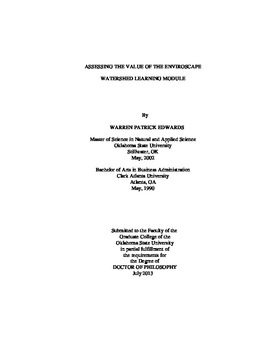Assessing the Value of the Enviroscape Watershed Learning Module
Assessing the value of the Enviroscape Watershed learning module
| dc.contributor.advisor | Marks, Steve | |
| dc.contributor.author | Edwards, Warren Patrick | |
| dc.date.accessioned | 2014-09-24T14:16:54Z | |
| dc.date.available | 2014-09-24T14:16:54Z | |
| dc.date.issued | 2013-07 | |
| dc.identifier.uri | https://hdl.handle.net/11244/11012 | |
| dc.description.abstract | Scope and Method of Study: The researcher's evaluation of the West Atlanta Watershed Alliance's (WAWA) programs highlighted that few if any of the offered educational programs included a program evaluation, especially the most promising, the Enviroscape® Watershed learning module. The education programs that were customized and developed by the education staff did not offer evaluations either. Additionally, these programs did not offer a pre or posttest. Students would visit the center, experience the "learning" and then leave. The problem was that no system was in place to assess the transfer of content or whether learning occurred. The purpose of this education study was to determine if the Enviroscape® Watershed learning module increases content knowledge, by collecting data from urban-suburban schools from third, fourth and fifth grade students. The sample population consisted of 62 elementary students in grades three, four and five from urban and suburban school districts. These participants were involved in the Watershed Alliance Outdoor Activity at the Bush Mountain Outdoor Activity Center from the years of 2011 to 2012. | |
| dc.description.abstract | Findings and Conclusions: The researcher, in partnership with the designer of the Enviroscape® Module, and the OAC Education director, was able to collect data from trained education facilitators at school sites from suburban and the Urban Atlanta Areas. Educators were recruited to participate in the study based on their prior experience with environmental activities at the center, and were teaching third, fourth and fifth graders. A slight increase was found between the pretest and posttest of participants' scores on the science content knowledge. After conducting a T-Test analysis of the data however, it was concluded that no significant difference existed between the scores. The results also showed no significant increase in the mean scores between urban and suburban participants' content knowledge science scores. Furthermore, the results of an ANOVA analysis of the data showed that there was not a significant difference between the groups in the science content knowledge for participants in the third, fourth and fifth grades. | |
| dc.format | application/pdf | |
| dc.language | en_US | |
| dc.rights | Copyright is held by the author who has granted the Oklahoma State University Library the non-exclusive right to share this material in its institutional repository. Contact Digital Library Services at lib-dls@okstate.edu or 405-744-9161 for the permission policy on the use, reproduction or distribution of this material. | |
| dc.title | Assessing the Value of the Enviroscape Watershed Learning Module | |
| dc.title | Assessing the value of the Enviroscape Watershed learning module | |
| dc.contributor.committeeMember | Beller, Caroline | |
| dc.contributor.committeeMember | Vitek, John D. | |
| dc.contributor.committeeMember | Mitchell, Earl | |
| osu.filename | Edwards_okstate_0664D_12987.pdf | |
| osu.accesstype | Open Access | |
| dc.type.genre | Dissertation | |
| dc.type.material | Text | |
| thesis.degree.discipline | Environmental Science | |
| thesis.degree.grantor | Oklahoma State University |
Files in this item
This item appears in the following Collection(s)
-
OSU Dissertations [11221]
